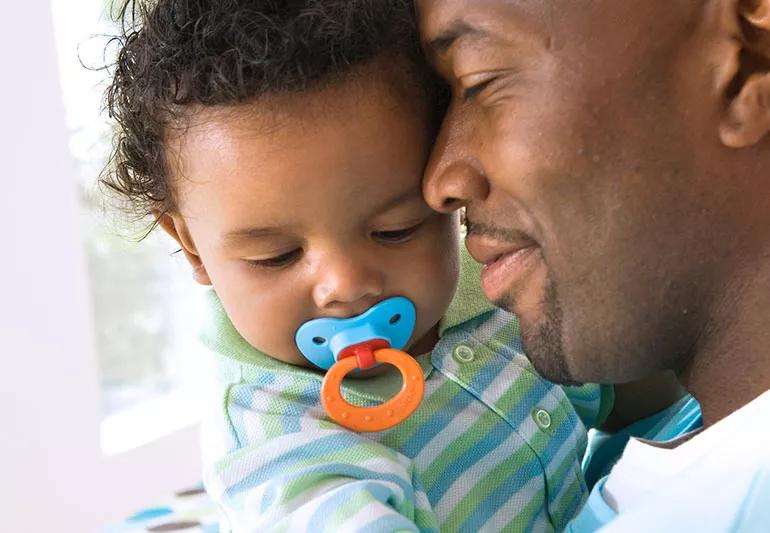
Image content: This image is available to view online.
View image online (https://assets.clevelandclinic.org/transform/eebe2a22-3ff4-426e-981f-25962bf33e52/fatherBabyPacifier-540191088_770x553_jpg)
baby with pacifier held by daddy
Pacifiers are hardly a new invention. “Archeologists have found pacifier-type objects made of silver, clay and even pearl, dating back thousands of years,” says pediatrician W. Kyle Mudd, DO.
Advertisement
Cleveland Clinic is a non-profit academic medical center. Advertising on our site helps support our mission. We do not endorse non-Cleveland Clinic products or services. Policy
Despite their ancient history, pacifiers still manage to stir up debate. Should you happily pop one in your baby’s mouth or steer clear? Dr. Mudd weighs the pacifier pros and cons.
Paci, binky, bo-bo or soothie: Pacifiers go by lots (and lots) of nicknames. Whatever you call them, it’s easy to see why so many parents swear by them. The nipple substitute soothes irritable babies by satisfying their natural need to suck. “It can be very helpful when an infant is fussing,” Dr. Mudd says.
A calm, quiet baby may be reason enough to hop aboard the binky train. But there’s another big benefit. “Numerous studies have shown that pacifiers reduce the risk of sudden infant death syndrome (SIDS), especially during the first six months of life,” Dr. Mudd says. SIDS, also known as crib death, is the sudden and unexplained death of a baby during the first year of life.
While pacifiers have some big benefits, there are some downsides. And since many babies often fall in love with theirs right away, it’s worth considering the pitfalls before you introduce them.
Advertisement
Babies are born to suck, and they can usually start using pacifiers right away. Dr. Mudd notes that pacifiers are often given to premature babies to help them develop the reflexes to suck and swallow.
If you’re breastfeeding, it helps to avoid using a pacifier for the first two to four weeks until your baby has feeding figured out. If you’re bottle-feeding, however, there’s no reason to wait.
Pacifiers are safe to use day and night, even when the baby is sleeping. But avoid using the binky to soothe a hungry baby. “Pacifiers shouldn’t be used to replace or delay meals, so we recommend offering them only when the baby isn’t hungry,” Dr. Mudd says.
You were counting on using pacifiers. But your wee one isn’t interested. Should you be worried? “Try not to overthink it,” Dr. Mudd says.
While pacifiers can be one tool for decreasing the risk of SIDS, they aren’t the most important. “The most important thing is to practice safe sleep,” Dr. Mudd says. Lie your baby down on their back, on a firm mattress, with no blankets or stuffed animals in the crib. “As long as you’re practicing safe sleep, I wouldn’t be concerned about a baby not wanting a pacifier.”
The pacifier aisle is almost as overwhelming as the cereal aisle with so many shapes, sizes and colors.
What should you look for in a binky? Dr. Mudd offers these tips for pacifier safety:
And if you do go the pacifier route, do yourself a favor and stock up, Dr. Mudd says. “It’s always good to have extras on hand. No matter how careful you are, they will be dropped and lost.”
Advertisement

Delivered every Tuesday!
Sign up for our Health Essentials emails for expert guidance on nutrition, fitness, sleep, skin care and more
It's a letter about the news!
Learn more about our editorial process.
Advertisement
What to know about keeping your baby's pacifier germ-free
Pacifiers have drawbacks as babies grow older
Bleeding is a risk and warrants taking care, but the reward of this lifesaving medication is great
Severe and debilitating headaches can affect the quality of your child’s life
With repeat injections over time, you may be able to slow the development of new wrinkles
Type 2 diabetes isn’t inevitable with these dietary changes
Applying a hot or cold compress can help with pain
Pump up your iron intake with foods like tuna, tofu and turkey